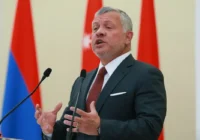History tells us that clarity exists in the will of those who want to go to war, but rarely in the facts cited as reasons for war. The Daily Devil’s Dictionary explains.
John Bolton, the US national security adviser, has moved his sights from last week’s Venezuela to this week’s Iran. Following the failed attempt to stage-manage a cleverly scripted revolution to overthrow Venezuelan President Nicolás Maduro, Washington has had to put that coup d’état on hold as it awaits the next opportunity to organize and execute a putsch, promising some supplementary suffering for the Venezuelan people.
According to Bolton, this week’s priority consists of sending “a clear and unmistakable message to the Iranian regime that any attack on United States interests or on those of our allies will be met with unrelenting force.” He might have more simply promised “fire and fury,” but the intellectual property for that phrase belongs to his boss, President Donald Trump.
The situation sounds dire. But, as The Guardian observed (in an earlier edition), it “was unclear on Sunday night what Iranian actions Bolton was referring to.”
Here is today’s 3D definition:
Unclear:
1. Not easy to understand and therefore perfectly exploitable to justify acts of war
2. An anagram of nuclear
Contextual note
The Guardian points to two reasons for deeming the announcement unclear: “There have been no recent incidents in the Persian Gulf where US and Iranian navies are routinely in close proximity and the Abraham Lincoln carrier strike group was already bound for the Gulf a month before Bolton made his announcement.” In other words, “no news” for the first reason and “old news” for the second. A media critic might see this simply as “fake news.” A psychoanalyst might get more technical and see this as compensatory macho behavior from warmonger John Bolton, who appears to be looking for ways to flex his muscles after the humiliation of Venezuela.
Applying the same reasoning to the man Bolton answers to, President Trump, some might suspect a “wag-the-dog” scenario. In this case, the still beleaguered Trump, facing possible impeachment, might be tempted to “take arms against a sea of troubles” by going to war with Iran. It would make sense from several points of view.
First, it would neutralize the ongoing assault from the Democrats who now control the House of Representatives. In their grand majority, Democrats in Congress are eager supporters of any war and applaud military action, even when foolishly engaged by Republicans in the White House, as “presidential.”
Second, it would thrill his great friend, Israeli Prime Minister Benjamin Netanyahu, whose own position at home, even surviving the recent election, has weakened at the same time as his coalition, once defined, will now probably include two extreme right, ultra-orthodox parties.
Third, it would postpone sine die the release of White House adviser Jared Kushner’s “deal of the century,” aka the peace plan for the Middle East, which all observers have noted has no hope of getting any traction because of its apparent pro-Israel bias and heartless dismissal of all Palestinian demands.
Fourth, it would immensely please Saudi Crown Prince Mohammed bin Salman, who has a developed taste for military action and needs a wagging dog to help people forget not only his ordering the assassination of Saudi journalist Jamal Khashoggi in Istanbul — which he continues to deny, with zero credibility — but also his consistently murderous oppression of domestic critics. By joining the US and Israel, a decidedly unholy three, in attacking Iran, it would also weaken the Houthi forces that have resisted Saudi Arabia’s “relentless,” costly and criminal military campaign that is still raging in Yemen.
Historical note
For over a century, US presidents have profited from decidedly unclear events to enter epic wars. These are conflicts that achieve no positive political outcomes in the short term while costing blood and treasure for both the US and its adversaries. Yet they have the marvelously positive effect of shaping and sustaining a powerfully militarized economy and feeding a national culture of what the population and media consistently frame as aggressive humanitarian justice. The wars in Korea, Vietnam, Afghanistan, Iraq, Libya, Syria, Somalia, to name just those, have all failed to achieve any other result than the pretext for the limitless growth of the US military machine and its expansion across the globe.
Bolton reassures the nation and the world: “The United States is not seeking war with the Iranian regime, but we are fully prepared to respond to any attack, whether by proxy, the Islamic Revolutionary Guard Corps, or regular Iranian forces.” Some, such as former State Department and Pentagon official Ilan Goldenberg, quoted in The Guardian’s article, assume it’s simple bluff: “The inflammatory language from Bolton is unusually provocative but my guess is just an opportunity to try to intimidate the Iranians. Nothing more.”
 Iranian Foreign Minister Mohammad Javad Zarif tends to agree, but he detects a potential wag-the-dog situation: “I think the US administration is putting things in place for accidents to happen. And there has to be extreme vigilance, so that people who are planning this type of accident would not have their way.”
Iranian Foreign Minister Mohammad Javad Zarif tends to agree, but he detects a potential wag-the-dog situation: “I think the US administration is putting things in place for accidents to happen. And there has to be extreme vigilance, so that people who are planning this type of accident would not have their way.”
Zarif’s fear of “accidents” clearly refers to some of the conveniently “unclear” events of history. These include the Gulf of Tonkin incidents that provided the pretext for US commitment to the war in Vietnam or the “proof” of Saddam Hussein’s weapons of mass destruction that convinced most of the political class in Washington to support the invasion of Iraq in 2003. Understanding that the pretext was phony has never stopped an already engaged war from proceeding. It’s always useful to “remember the Maine.”
The US is not alone in the art of fabricating accidental starts to wars. Business Insider reports that one of British Prime Minister Theresa May’s possible motives for dismissing her defense secretary, Gavin Williamson, was that he “wanted to invade … at least five African countries, including Zimbabwe, Nigeria, Kenya and Egypt.” As there were no obvious reasons for doing so, the article explains that defense “officials told the paper [The Sunday Times] that Williamson wanted to ‘find excuses to send troops.’”
That might have happened had Williamson not had the indiscretion to disclose to the outside world May’s confidential decision authorizing Huawei to participate in building the UK’s new 5G network. The Huawei affair was officially the “accident” that led to his dismissal and saved five African countries from a British invasion. Prime Minister May’s willingness to invade Africa remains, nevertheless, “unclear.” She may have been tempted. After all, it worked for Margaret Thatcher, who became the “Iron Lady” by going to war with Argentina over the Falkland Islands.
*[In the age of Oscar Wilde and Mark Twain, another American wit, the journalist Ambrose Bierce, produced a series of satirical definitions of commonly used terms, throwing light on their hidden meanings in real discourse. Bierce eventually collected and published them as a book, The Devil’s Dictionary, in 1911. We have shamelessly appropriated his title in the interest of continuing his wholesome pedagogical effort to enlighten generations of readers of the news.]
The views expressed in this article are the author’s own and do not necessarily reflect Fair Observer’s editorial policy.
Support Fair Observer
We rely on your support for our independence, diversity and quality.
For more than 10 years, Fair Observer has been free, fair and independent. No billionaire owns us, no advertisers control us. We are a reader-supported nonprofit. Unlike many other publications, we keep our content free for readers regardless of where they live or whether they can afford to pay. We have no paywalls and no ads.
In the post-truth era of fake news, echo chambers and filter bubbles, we publish a plurality of perspectives from around the world. Anyone can publish with us, but everyone goes through a rigorous editorial process. So, you get fact-checked, well-reasoned content instead of noise.
We publish 2,500+ voices from 90+ countries. We also conduct education and training programs
on subjects ranging from digital media and journalism to writing and critical thinking. This
doesn’t come cheap. Servers, editors, trainers and web developers cost
money.
Please consider supporting us on a regular basis as a recurring donor or a
sustaining member.
Will you support FO’s journalism?
We rely on your support for our independence, diversity and quality.






